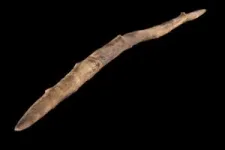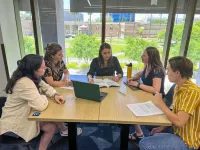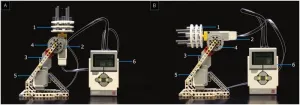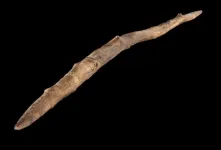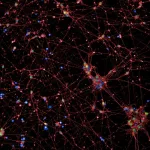(Press-News.org) A study of data from about 500,000 people in the UK Biobank has uncovered small but statistically significant associations between signs of systemic inflammation and later risk of dementia. Dr. Krisztina Mekli of The University of Manchester, UK, and colleagues present these findings in the open-access journal PLOS ONE on July 19, 2023.
Millions of people around the world have Alzheimer’s disease or other types of dementia, and researchers are working to tease out the complex mechanisms behind these conditions. Prior research has suggested that inflammation—activation of the body’s innate immune system—may play a contributing role in the onset of dementia.
To help clarify this potential role, Dr. Mekli and colleagues analyzed data from nearly 500,000 participants in a large, multifaceted health study called the UK Biobank. They evaluated the relationship between certain biological measures—biomarkers—of inflammation and participants’ performance on various cognitive tests, assessed both at the same time as the biomarkers and years later, as well as if they were later diagnosed with dementia.
The analysis accounted for various demographic factors, other health factors, and whether participants had a variant of the APOE gene that is known to be associated with higher risk of dementia.
The researchers found that higher levels of inflammatory biomarker levels were associated with increased risk of dementia diagnosis three to eleven years later. Elevated inflammatory biomarkers were also associated with worse performance on certain cognitive measures, including tasks related to prospective memory, fluid intelligence, and reaction time, both at baseline and four to thirteen years later.
These associations were small, but they were statistically significant, suggesting that systemic inflammation may contribute to dementia. While other known biomarkers, such as APOE status, appear to have a stronger association with dementia, it is possible that measuring inflammatory biomarkers could be an additional useful tool for identifying people who may be at higher risk of developing dementia.
The authors note that this study is exploratory and that further research will be needed to better understand the inflammation-dementia link and its potential clinical applications.
Dr. Mekli adds: “In this study, we found associations between higher systemic inflammation levels and risk of being diagnosed with dementia 3-11 years later, although the increase in risk is small. This association of course does not mean causality, therefore further research is needed to understand and evaluate the potential mechanism. In addition, high levels of inflammation might be one of the biomarkers which helps to identify people who have elevated risk of developing dementia in the near future.”
#####
In your coverage please use this URL to provide access to the freely available article in PLOS ONE: https://journals.plos.org/plosone/article?id=10.1371/journal.pone.0288045
Citation: Mekli K, Lophatananon A, Maharani A, Nazroo JY, Muir KR (2023) Association between an inflammatory biomarker score and future dementia diagnosis in the population-based UK Biobank cohort of 500,000 people. PLoS ONE 18(7): e0288045. https://doi.org/10.1371/journal.pone.0288045
Author Countries: UK
Funding: This work was funded by the Advantage Foundation. The funders had no role in study design, data collection and analysis, decision to publish, or preparation of the manuscript.
END
Large study finds small associations between systemic inflammation and later dementia
UK Biobank data analysis suggests inflammatory biomarkers might help identify risk of dementia
2023-07-19
ELSE PRESS RELEASES FROM THIS DATE:
STEM instructors who are women drive disclosure of concealable stigmatized identities to undergraduates
2023-07-19
Women working as STEM instructors are more likely than men in the same profession to disclose to their undergraduate students identities which could carry stigma, such as depression or growing up in a low-income household. In the new study, published July 19, 2023 in the open-access journal PLOS ONE, Carly Busch of Arizona State University, USA, and colleagues suggest that these decisions to disclose may be in order to act as role models for students.
Concealable stigmatized identities (CSIs) are identities that ...
Researchers used a LEGO robotics kit as a cheap, effective way to purify self-assembling DNA origami
2023-07-19
Article URL: https://journals.plos.org/plosone/article?id=10.1371/journal.pone.0283134
Article Title: Gradient-mixing LEGO robots for purifying DNA origami nanostructures of multiple components by rate-zonal centrifugation
Author Countries: USA
Funding: The research in Hariadi lab was supported by the National Institutes of Health Director’s New Innovator Award (1DP2AI144247), National Science Foundation SemiSynBio II (2027215), and Arizona Biomedical Research Consortium (ADHS17-00007401). The funders had no role in study design, data collection and analysis, decision to publish, or preparation of the manuscript. END ...
A 300,000 year-old double-pointed wooden stick was produced by Middle Pleistocene humans using sophisticated woodworking techniques and was likely used for throwing during hunts
2023-07-19
Article URL: https://journals.plos.org/plosone/article?id=10.1371/journal.pone.0287719
Article Title: A double-pointed wooden throwing stick from Schöningen, Germany: Results and new insights from a multianalytical study
Author Countries: UK, Germany
Funding: T.T. and this project are funded by the Deutsche Forschungsgemeinschaft (DFG, German Research Foundation) – project number 447423357. https://www.dfg.de/. The project is further funded by the Lower Saxony Ministry for Science and Culture, with funds from the Future Lower Saxony Programme of the Volkswagen Foundation – project ...
1 in 5 rabbit owners in the UK report painful or debilitating ear disease in their pet, though it may be under-diagnosed and under-treated, with lop-eared and older rabbits being most at risk
2023-07-19
Article URL: https://journals.plos.org/plosone/article?id=10.1371/journal.pone.0285372
Article Title: Ear health and quality of life in pet rabbits of differing ear conformations: A UK survey of owner-reported signalment risk factors and effects on rabbit welfare and behaviour
Author Countries: UK
Funding: The authors received no specific funding for this work. M.R.D.K included some of this questionnaire in part-fulfilment of her Bachelor of Veterinary Medicine at Royal Veterinary College. ...
CHOP researchers reveal how NSAIDs worsen C. difficile infections
2023-07-19
Philadelphia, July 19, 2023—Why do nonsteroidal anti-inflammatory drugs (NSAIDs) exacerbate gastrointestinal infections by Clostridioides difficile, the leading cause of antibiotic-associated diarrhea worldwide? In a new paperpublished in Science Advances, researchers at Children’s Hospital of Philadelphia (CHOP) have begun to answer that question, showing that NSAIDs disrupt the mitochondria of cells lining the colon, sensitizing them to damage by pathogenic toxins.
Clostridioides ...
Early humans were weapon woodwork experts, study finds
2023-07-19
A 300,000-year-old hunting weapon has shone a new light on early humans as woodworking masters, according to a new study.
State-of-the-art analysis of a double-pointed wooden throwing stick, found in Schöningen in Germany three decades ago, shows it was scraped, seasoned and sanded before being used to kill animals. The research indicates early humans’ woodworking techniques were more developed and sophisticated than previously understood.
The findings, published today (Wednesday, 19 July) in PLOS ONE, also suggest the ...
New therapeutic target for Parkinson’s disease discovered
2023-07-19
· Contacts between lysosomes and mitochondria are broken due to Parkinson’s mutation
· Lysosomes cannot ‘feed’ mitochondria with essential metabolites
CHICAGO --- Northwestern Medicine scientists have uncovered a new mechanism by which mutations in a gene parkin contribute to familial forms of Parkinson's disease. The discovery opens a new avenue for Parkinson’s therapeutics, scientists report in a new study.
The Northwestern scientists discovered that mutations in parkin result in a breakdown ...
Enabling autonomous exploration
2023-07-19
A research group in Carnegie Mellon University's Robotics Institute is creating the next generation of explorers — robots.
The Autonomous Exploration Research Team has developed a suite of robotic systems and planners enabling robots to explore more quickly, probe the darkest corners of unknown environments, and create more accurate and detailed maps. The systems allow robots to do all this autonomously, finding their way and creating a map without human intervention.
"You can set it in any environment, like a department store or a residential building after a disaster, and off it goes," ...
More than just lifestyle and genes: New factor influencing excess body weight discovered
2023-07-19
What determines whether we become overweight? Aside from lifestyle, predisposition plays a role, but genes cannot fully explain the inherited propensity to accumulate excess weight. A new study by Charité – Universitätsmedizin Berlin in Science Translational Medicine* shows that a kind of formatting of the DNA code in one gene that is associated with satiety is implicated in a slightly elevated risk of excess body weight – at least in women. This “epigenetic marking” is established early on during the embryonic stage.
People who are overweight, especially those who ...
Fighting brain cancer
2023-07-19
“Don’t eat me!” That’s how one might translate the signal that the cancer cells in a glioblastoma send to the macrophages (white blood cells specialized in removing dead and dying cellular matter) in the brain. Immunotherapy attempts to enable these cells to eradicate the abnormal cells, but so far, it has met with little success when it comes to glioblastomas.
Researchers led by Professor Gregor Hutter from the Department of Biomedicine at the University and University Hospital Basel have recently used patient data, experiments with mice, and samples from human tumors to study one of these “don’t eat me!” signals and its inhibitory ...
LAST 30 PRESS RELEASES:
Fossil amber reveals the secret lives of Cretaceous ants
Predicting extreme rainfall through novel spatial modeling
The Lancet: First-ever in-utero stem cell therapy for fetal spina bifida repair is safe, study finds
Nanoplastics can interact with Salmonella to affect food safety, study shows
Eric Moore, M.D., elected to Mayo Clinic Board of Trustees
NYU named “research powerhouse” in new analysis
New polymer materials may offer breakthrough solution for hard-to-remove PFAS in water
Biochar can either curb or boost greenhouse gas emissions depending on soil conditions, new study finds
Nanobiochar emerges as a next generation solution for cleaner water, healthier soils, and resilient ecosystems
Study finds more parents saying ‘No’ to vitamin K, putting babies’ brains at risk
Scientists develop new gut health measure that tracks disease
Rice gene discovery could cut fertiliser use while protecting yields
Jumping ‘DNA parasites’ linked to early stages of tumour formation
Ultra-sensitive CAR T cells provide potential strategy to treat solid tumors
Early Neanderthal-Human interbreeding was strongly sex biased
North American bird declines are widespread and accelerating in agricultural hotspots
Researchers recommend strategies for improved genetic privacy legislation
How birds achieve sweet success
More sensitive cell therapy may be a HIT against solid cancers
Scientists map how aging reshapes cells across the entire mammalian body
Hotspots of accelerated bird decline linked to agricultural activity
How ancient attraction shaped the human genome
NJIT faculty named Senior Members of the National Academy of Inventors
App aids substance use recovery in vulnerable populations
College students nationwide received lifesaving education on sudden cardiac death
Oak Ridge National Laboratory launches the Next-Generation Data Centers Institute
Improved short-term sea level change predictions with better AI training
UAlbany researchers develop new laser technique to test mRNA-based therapeutics
New water-treatment system removes nitrogen, phosphorus from farm tile drainage
Major Canadian study finds strong link between cannabis, anxiety and depression
[Press-News.org] Large study finds small associations between systemic inflammation and later dementiaUK Biobank data analysis suggests inflammatory biomarkers might help identify risk of dementia

